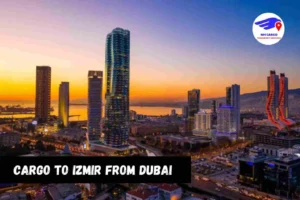In the ever-evolving world of global logistics, efficient and reliable cargo transportation is essential for maintaining the flow of goods across borders. This article provides a detailed guide on transporting cargo from Dubai to Izmir, focusing on key considerations, available services, and best practices to ensure a smooth shipping process.
1. Overview of Cargo Transportation from Dubai to Izmir
Dubai, a major logistics hub in the Middle East, offers extensive connectivity to international destinations. Izmir, a key city on Turkey’s Aegean coast, is a vital trade center with a robust port infrastructure. The route between these two cities encompasses a range of transportation options, including air and sea freight.
2. Transportation Options
2.1 Air Freight
Air freight is a preferred choice for time-sensitive cargo due to its speed and efficiency. Major airlines operating out of Dubai International Airport (DXB) offer services to Adnan Menderes Airport (ADB) in Izmir. This option is ideal for high-value goods, perishable items, and urgent shipments.
- Advantages:
- Speedy delivery
- Reliable and trackable
- Suitable for high-value and urgent shipments
- Disadvantages:
- Higher costs compared to sea freight
- Limited cargo capacity
-

Cargo To Izmir From Dubai
2.2 Sea Freight
For larger or heavier shipments, sea freight is a cost-effective alternative. The Port of Dubai and the Port of Izmir are both well-equipped to handle substantial cargo volumes. Sea freight services typically involve container shipping, which can be either full-container loads (FCL) or less-than-container loads (LCL).
- Advantages:
- More economical for bulk shipments
- Suitable for a wide range of goods
- Disadvantages:
- Longer transit times
- Potential for delays due to weather or port congestion
3. Documentation and Customs Requirements
3.1 Required Documentation
Shipping cargo from Dubai to Izmir requires several key documents to ensure compliance with international regulations:
- Commercial Invoice: Details the transaction between the buyer and seller, including item descriptions, quantities, and values.
- Packing List: Provides information on the contents of each package, including dimensions and weights.
- Bill of Lading: A legal document issued by the carrier, serving as a receipt for the cargo and a contract for its transport.
- Certificate of Origin: Certifies the origin of the goods, often required for customs clearance.
Transporting cargo from Dubai to Izmir involves careful planning and consideration of various factors, including transportation options, documentation, and customs requirements. By choosing the right shipping partner, ensuring proper packaging, and staying informed throughout the process, you can facilitate a smooth and efficient shipping experience. For further assistance and expert guidance, consider reaching out to a professional logistics provider with experience in this route.




